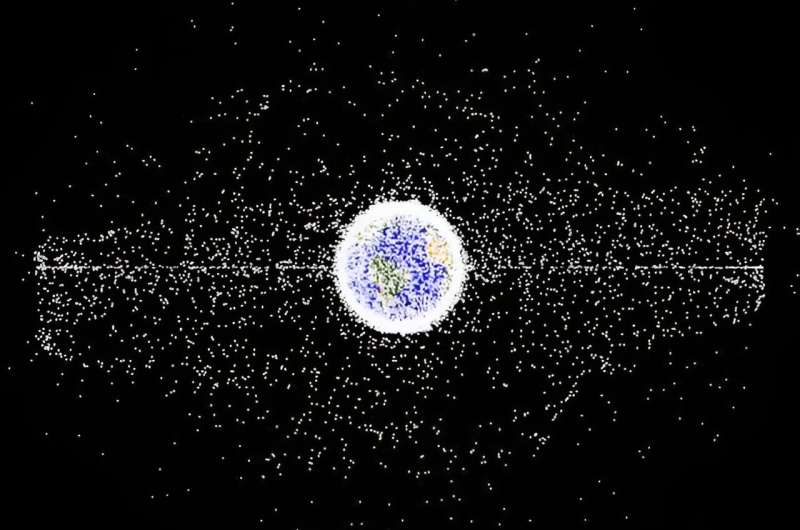This article has been reviewed according to Science X's editorial process and policies. Editors have highlighted the following attributes while ensuring the content's credibility:
fact-checked
trusted source
written by researcher(s)
proofread
Russia's space weapon: Anti-satellite systems are indiscriminate, posing a risk to everyone's spacecraft

In a week where national security has taken center stage in Washington, the White House confirmed on Thursday that it had evidence that Russia was developing a space-based nuclear anti satellite weapon.
John Kirby, the National Security Council spokesperson, informed reporters that the White House believe Russia's program to be "troubling," despite "no immediate threat to anyone's safety."
The problem is that, depending on what type of weapon this is, the consequences of using it could be indiscriminate—threatening everyone's satellites and causing a breakdown of the vital services that come from space infrastructure.
The White House revelations come after House Intelligence Committee Chairman Mike Turner urged the administration, late on Wednesday, to declassify information concerning what he called a "serious national security threat." There were then several days of comments and speculation about Russia either being ready to launch a nuclear weapon into space, or deploying an anti-satellite weapon powered by nuclear energy.
Kirby did not fully outline the nature of the threat, but he added that officials believed the weapons system was not an "active capability" and had not been deployed. To reassure those listening, Kirby said that the weapon was not one that could be used to cause physical destruction on Earth but that the White House was monitoring Russian activity and would "continue to take it very seriously."
During a visit to Albania on Thursday, Secretary of State Antony Blinken confirmed the news and stated that he expected to have more to say soon, adding that the Biden administration was "also conferring with allies and partners on the issue."
While discussing the matter with Indian Foreign Minister Jaishankar and Chinese Foreign Minister Wang Yi at the Munich Security Conference, Blinken is reported to have "emphasized that the pursuit of this capability should be a matter of concern."
Denials from Russia
Moscow immediately denied the existence of such a program and stated that it was a "malicious fabrication" created by the Biden administration to pressurize Congress into passing the USD$97bn (£77bn) foreign aid bill, $60bn of which was destined for Ukraine. Kremlin spokesman Dmitry Peskov told reporters: "It is obvious that the White House is trying, by hook or by crook, to encourage Congress to vote on a bill to allocate money; this is obvious."
At a press conference on the death of Russian opposition leader Alexei Navalny, Joe Biden stated that there was "no nuclear threat to the people of America or anywhere else in the world with what Russia is doing at the moment."
The president added that there was "no evidence that they have made a decision to go forward with doing anything in space either." If Moscow did decide to go ahead with the program it would be contrary to the Outer Space Treaty which 130 countries have signed onto, including Russia.
The treaty prohibits "nuclear weapons or any other kinds of weapons of mass destruction" in orbit or stationing weapons in outer space "in any other manner." Anti-satellite weapons are nothing new. China launched a weapon to destroy a non-operational weather satellite in January 2007.
While the temptation to launch a nuclear strike in space may seem alluring to nations looking to challenge US dominance in the domain, such actions come at huge risk. It is not necessarily the destruction of objects in space from Earth that should be the primary concern when it comes to anti-satellite weapons more generally, but the effect they have in space.
Mass of debris
The destruction of any celestial object creates a mass of debris varying in size from a few millimeters to several centimeters. Currently, there are hundreds of millions of tracked pieces of space debris orbiting the Earth.
The speed at which this space debris is traveling makes it a major hazard to other satellites and entities in space such as the International Space Station (ISS), which has to change course in order to avoid collisions which can cause widespread damage. The ISS has had to changed course 32 times since 1999.
Once space debris has been created, it is almost impossible to control the trajectory after the strike or the orbital pattern it will take around the Earth. This can put a nation's space assets—such as its satellites—at the same risk of destruction as that of an adversary. This situation has been described in similar terms to that applied to nuclear weapons on Earth, in terms of mutually assured destruction.
If a nuclear strike were to be conducted by a nation in space with the intention of destroying satellites and also to demonstrate both an ability and willingness to use nuclear weapons more generally, it would be next to impossible to control the consequences of such an action.
It would be fairly certain that such a strike would have the intended effect in reducing the space capabilities of an opponent. For example, an attack on US assets could disable the satellite-based global positioning system (GPS) that is relied on by western nations.
There is, however, the very real possibility that it would also destroy the space assets of the nation behind the attack, as well as allies and friends of that same nation. This could lead to tensions being raised and lead to a loss of that country's support.
The inability to control the effects of attacks in space, whether they originate from a weapon in space or on the Earth, makes such actions subject to a great degree of consideration and debate in all nations that are active in the space domain.
Provided by The Conversation
This article is republished from The Conversation under a Creative Commons license. Read the original article.![]()





















